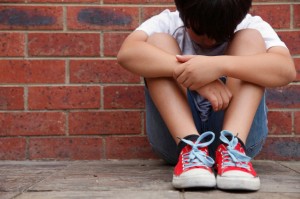Watch Your Child for PTSD
Understand How Sexual Abuse Affects Your Child
Discovering that your child has been the victim of sexual abuse means coping with a myriad of your own feelings while trying to express the love, security and understanding your child needs.
As an adult, you are capable of working through these emotions logically and developing your path for healing. However, your child may continue to exhibit behavior after the abuse has ended.
These post-traumatic stress reactions – known as PTSD – can make healing even more difficult.
While it is crucial to your child’s well-being that he or she receive attention from a trained counselor, recognizing the signs of post-traumatic stress reactions in children can help you continue to offer the support and unconditional love your child needs to heal:
-
Hyperarousal:
Your child may constantly seem in high gear. Nervous, jumpy and easily startled, a recovering victim of child sexual abuse may react more strongly to any anxiety-producing situation. Other symptoms of hyper-arousal are difficulty sleeping or concentrating, irritability, anger, panic or being hyper-aware to any potential dangers.
-
Re-experiencing:
Your child may keep seeing mental images linked to the abuse, or relive some aspects of the experience, either while awake or during sleep in the form of nightmares. You might find that your child experiences insomnia or has trouble staying asleep. Younger victims of child sexual abuse may have nightmares about seemingly unrelated, scary things, such as monsters or ghosts. Older sexual abuse victims may experience nightmares directly related to the trauma. Even while awake, your child may suffer from triggers that cause them to relive the experience of their abuse. For example, encountering an individual who shares characteristics with their abuser, such as a beard or a similar sounding voice, may make your child feel uncomfortable and frightened.
-
Avoidance:
When your child avoids exposure to traumatic reminders, and sometimes avoids thinking about the abuse altogether. Avoidance can show itself in specific behavior or become generalized. A child that has experienced sexual abuse in a classroom may refuse to enter a similar space, or any area that reminds them of the scene of their abuse.
How Symptoms May Show at Different Ages

As children grow up and develop, they can experience severe difficulties relating to sexual abuse including substance abuse and engaging in other dangerous behavior. Normally chatty and open teenagers may socially withdraw, and without proper treatment, teenagers may try unhealthy coping mechanisms.
Knowing What To Do Next
Symptoms of post-traumatic stress can seriously limit your child’s daily life and ability to recover. However, with parental support and effective treatment, many children recover from the long-term effects of abuse and go on to live happy, well-adjusted lives.
If you know that your child has suffered sexual abuse, it is important that you speak with a professional counselor as soon as possible. Getting help is the first step to avoiding the serious impact sexual assault victims can experience for a lifetime.